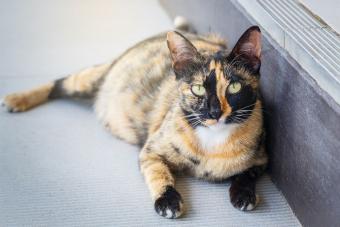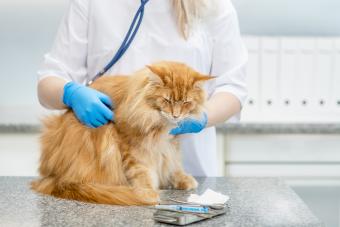
Veterinarians can pursue a number of different specialties, including feline medicine. When searching for cat-specific information, a vet who is board-certified in cat care is an excellent resource for learning about how to care for your pet. An experienced specialist offers vet advice for cats on feeding, medical issues, and how to help your cat live the longest, happiest, and healthiest life possible.
Meet Cat Vet Dr. Sarah Caney
Dr. Sarah Caney, BVSc Ph.D. DSAM (Feline) MRCVS, is a certified specialist in feline medicine and the founder of Vet Professionals, a website devoted to veterinary education with a dedicated division for feline care called Cat Professional. Dr. Caney describes her background by stating, "I have worked exclusively with cats since 1994. I qualified as a vet (University of Bristol, UK) in 1993 and after spending a year treating all small animals, I took up a feline only specialist training post at the University of Bristol."
She continues, "At the time, I didn't think that I would only be working with cats forever -- I was just taking an opportunity to learn more about the species. However, after only a few months, I fell in love with the job, deciding that feline medicine was my vocation. Since then, I have only worked with cats."
Her advanced credentials and experience make her an expert in the field and exceedingly qualified to offer vet advice for cats on a number of topics. Dr. Caney explains, "My career has involved both first opinion and referral feline medicine, so I have seen a large number of both simple and complex illnesses in cats. This has been an invaluable part of my training to become a specialist."
Unique Approach to Caring for Cats
As a cat owner, you understand that cats are not simply small dogs -- they are incredibly different when it comes to personality, behavior, and even medical care. Dr. Caney agrees, stating "Cats are completely different, and so are their owners. Cats are much more of a challenge to treat since, unlike a dog, they won't 'sit' or 'stay' when asked."
When working with cats, veterinary staff must take a unique approach. "To examine a cat, you have to gain its trust and respect -- you cannot force a cat to do anything that it doesn't want to do." Dr. Caney states. "I think it must be similar working with very small children; you have to persuade the cat that it wanted to open its mouth rather than you being the person that has forced this upon it."
Various training programs have been developed to instruct veterinary professionals and other feline caregivers on cat-specific techniques. This knowledge successfully minimizes stress for this sensitive species. Two popular programs are Cat Friendly Practice and Fear Free. In addition to seeking out a feline specialist for your cat's care, you could search for a practice or veterinarian with these credentials.
Recommended Cat Diets
Nutrition is no doubt a huge part of overall health; therefore, many cat owners inquire about the best type of food to feed their feline friend. Dr. Caney warns that, "Feline nutrition has entered some controversial times recently, and I'm not sure that there are easy answers to be obtained."

The Big Debate: Wet Vs. Dry Food
The biggest debate is whether wet food or dry food are better for cats. Dr. Caney reports, "There are advantages and disadvantages to both wet and dry food. For example, dry food is very convenient and probably helps keep the teeth clean, but some cats eating a dry diet do not drink enough water, and this can be bad for cats vulnerable to renal and urinary problems." Alternatively, there are pros and cons to canned food. She continues, "Wet food is better for cats with urinary problems, but it's less convenient to leave out for your cat if you are out working. Many people also feel that wet food is worse for the teeth."
Dr. Caney offers suggestions on how to address this question and possibly reach a compromise -- consider feeding both wet and dry food. "Many cats in the UK are fed a mixture of canned food (or pouches) and dry biscuits. This is probably a good compromise." she says. "In general, if you are happy with your cat's health on the diet it is receiving, I would not advise changing it."
Your personal veterinarian knows your cat and their medical history; therefore, they are the best person to make a tailored recommendation for your unique kitty. Dr. Caney does caution owner, "If you do want to change from wet to dry food (or vice versa), this should always be done gradually."
Common Cat Health Issues
Considering felines are so unique, they are at greater risk for certain diseases. Many of these are chronic conditions as a result of progressive organ changes over time. Dr Caney states, "Fortunately, many cats are now living to advanced ages. It's not unusual to treat 20-year-old cats these days, but this does also mean that we are seeing more cats with geriatric illnesses, such as kidney disease and thyroid disease."
The best way to catch conditions early is to schedule regular annual examinations for your cat. Based on the physical exam findings, your veterinarian may recommend routine bloodwork to rule out any internal changes. Some of the most common diseases seen in feline patients include the following.
- Chronic renal disease
- Hyperthyroidism
- Diabetes
- Urinary issues (feline lower urinary tract disease, crystals, or urinary obstruction)
- Upper respiratory infection
- Dental disease
- Cancer
Keeping your cat indoors may be the best way to ensure they live a long and healthy life. Dr. Caney shares, "Many cats in the UK have access to the outdoors, so sadly, cat fights and car accidents are a common cause of feline injuries."
Dr. Caney also warns that, "Cats are very vulnerable to infectious diseases, and cat flu is one of the most common illnesses we see." Other prevalent illnesses include feline infectious peritonitis (FIP), feline leukemia (FeLV), and feline immunodeficiency virus (FIV). Therefore, vaccination to prevent potentially fatal viruses is also important.
A Feline Specialists' Philosophy on Cat Vaccinations
Dr. Caney is, "A strong believer in vaccination. There is no doubt in my mind that vaccination has saved the lives of millions of cats." When asked which vaccines are the most important for cats, she advises, "Vaccination against cat flu (herpes and calicivirus) and panleukopenia (also known as feline parvo and infectious enteritis) are most important -- often referred to as the 'core' vaccines. I advise that all cats receive a primary course of these vaccinations when they are kittens with a booster vaccination one year later."

Recommendations For Indoor vs. Outdoor Cats
Following this kitten series, however, a cat's lifestyle, exposure, and risk can dictate which future vaccines she recommends. "After this, my advice depends on the individual cat and its situation," Dr. Caney shares. "If the cat is indoor-only and never needs to attend a boarding cattery, less frequent vaccination can be justified, such as administering a booster vaccination every three years."
"For cats that have access outdoors and hence may come into contact with other cats, cats that attend cat shows or boarding catteries, or cats that belong to people working with cats (such as myself), annual boosters for cat flu are recommended."
Vaccine Frequency
The frequency of vaccines is based on several factors, including the manufacturer's guidelines, legal requirements depending on location, as well as a cat's immune response to the vaccine. Dr. Caney explains, "This is especially important since immunity to flu viruses does start to wane with time, leaving the cat vulnerable to illness."
"Immunity to panleukopenia is much longer, so boostering at three yearly intervals is acceptable. Most vaccines have flu and panleukopenia combined into a single injection, meaning that it is not always possible to separate out the different components and give these at different intervals."
The Benefits of Feline-Only Practices
Although practices dedicated to serving only cats are available, these types of facilities are not necessarily common. An excellent alternative is a dedicated wing or facility within a hospital used only for cats. Dr. Caney believes that these types of facilities are essential, explaining, "A cat that has to sit in a waiting room full of noisy dogs is likely to become very stressed, and this affects it in so many ways. The cat is more difficult to examine, has increased heart rate and blood pressure, and lab tests (for example, blood sugar levels) are also commonly affected."
In 2012, the American Association of Feline Practitioners (AAFP) launched a program dedicated to promoting these cat-friendly environments. Practices that demonstrate specific criteria like a cat-only lobby and feline specific exam rooms can earn recognition as a Cat Friendly Practice.
Dr. Caney believes that these feline-only or feline-friendly offices benefit everyone. She states, "All of the practices where I have worked have separate wards for the cats, and this too is essential to encouraging a more rapid recovery from illness. It also makes for a more stress-free time for the vets and owners too."
Areas of Improvement in Cat Care
With the ever-changing world of medicine, new findings and innovations are constantly being discovered. Dr. Caney states that, "The standard of pet care has improved enormously since I qualified as a vet in 1993. A testimony to this is the fact that many cats are living so much longer." However," she warns, "There are areas that could be improved."

Dr. Caney feels strongly about promoting feline weight management, as this is an increasing problem. Unfortunately, 59.5 percent of cats are defined as being overweight or obese, and the numbers continue to climb. She states, "There are now more obese cats, and this is leading to an increase in the frequency of diabetes mellitus -- a serious medical condition." To combat this, ensure that you feed your cat an appropriate volume of food and encourage physical activity through playful interaction and toys.
With so many cats living longer lives, it's important for cat owners to understand additional care requirements that come with age. Dr. Caney advises, "Many are arthritic, but this can be difficult to spot because cats are not usually lame. They just spend more time sleeping and move less to cope with their pain. There are treatments for arthritis, and it would be good if we could help more cats lead a comfortable, pain-free life."
How to Provide the Best Care For Your Cat
Your cat needs nutritious food, veterinary support, and heaps of TLC in order to live a long and healthy life. Dr. Caney recommends that all cat owners, "Find a good vet who you can have a good relationship regarding your cat." She advises that cat owners can easily seek out a feline specialist or veterinarian with a special interest in cats through the AAFP website if in the USA. Canada has a similar program called Cat Healthy.
Dr. Caney advises owners in the UK, "The Feline Advisory Bureau, (now known as International Cat Care, a cat charity) has a similar facility on its website that directs people to cat-interested vets in the UK and overseas." Whoever you elect to receive professional cat care from, be sure to express any concerns or questions you might have. Your vet wants to help you and your cat live a healthy and happy life together.







